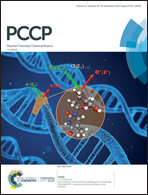Odd–even harmonic generation from oriented CO molecules in linearly polarized laser fields and the influence of the dynamic core-electron polarization
Abstract
We present a detailed theoretical study of the odd–even harmonics generated from the polar molecule CO by the method based on numerically solving the time-dependent Schrödinger equation within the single-active-electron approximation. First, we reproduce the pure even harmonic generation of CO predicted theoretically by Hu et al. using the time-dependent density functional theory [H. Hu et al., Phys. Rev. Lett., 2017, 119, 173201]. Then, based on the Floquet approach, we are able to attribute this behavior to the half-cycle mirror symmetry of the molecule–field system when the polar molecule is perpendicular to the laser polarization. By numerical simulations, we show that this symmetry is broken at orientation angles other than 90° resulting in the odd–even harmonic generation and a non-trivial even-to-odd harmonics ratio strongly dependent on the molecular orientation. Furthermore, we investigate the influence of the dynamic core-electron polarization (DCeP) on the odd–even behavior near the cutoff of the high-order harmonic spectra. We emphasize that the DCeP effect is noticeable for the odd harmonics only.



 Please wait while we load your content...
Please wait while we load your content...